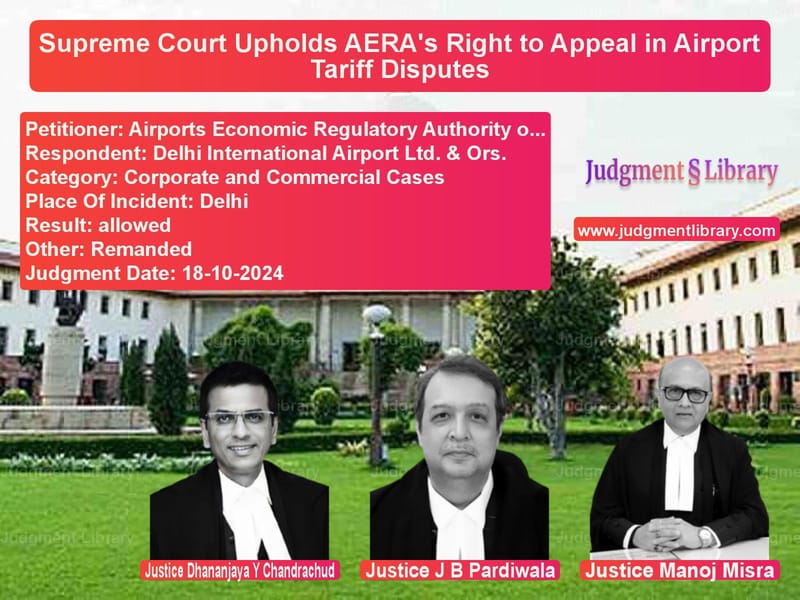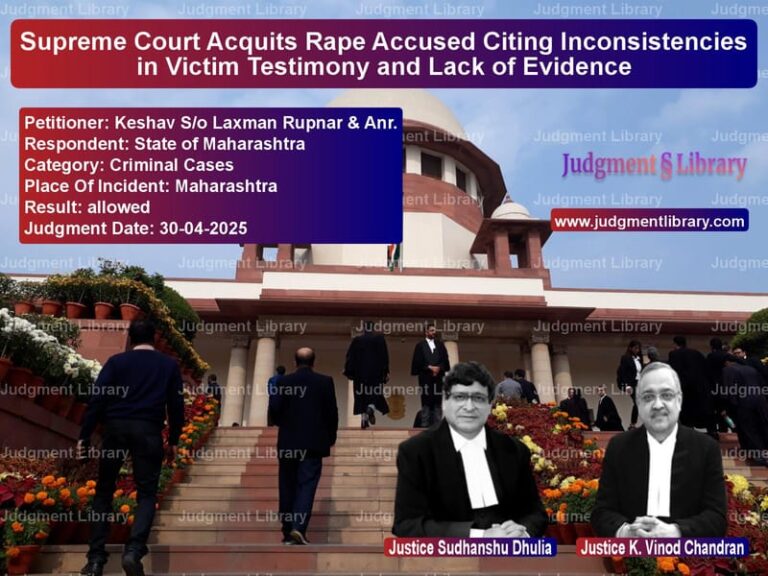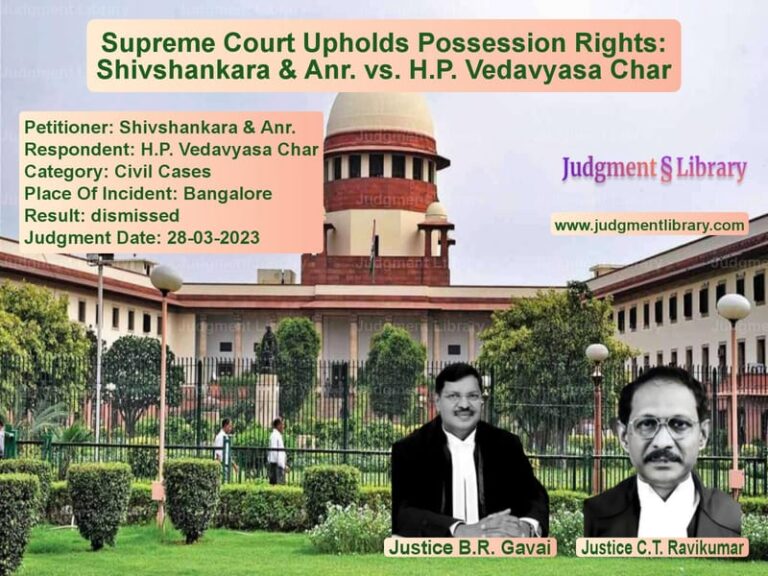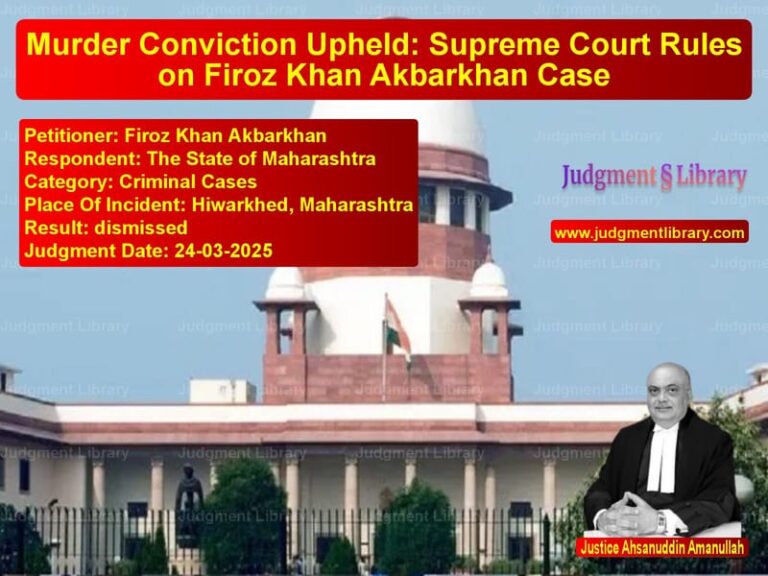Supreme Court Upholds AERA’s Right to Appeal in Airport Tariff Disputes
The case of Airports Economic Regulatory Authority of India (AERA) versus Delhi International Airport Ltd. & Ors. is a landmark judgment concerning the regulatory authority’s right to appeal in matters related to tariff determination for aeronautical services. The primary legal issue in this case was whether AERA, a quasi-judicial body, could file an appeal against the decision of the Telecom Disputes Settlement and Appellate Tribunal (TDSAT), which had ruled against AERA’s tariff determinations.
The Supreme Court, through an in-depth examination of statutory provisions, precedents, and the nature of AERA’s functions, upheld AERA’s right to challenge decisions that impact its regulatory authority. This judgment sets a precedent for regulatory bodies in India, affirming their role in ensuring economic governance and consumer protection.
Background of the Case
The AERA Act, 2008, established AERA to regulate tariffs and other charges related to aeronautical services at major airports in India. Its key functions include:
- Determining tariffs for aeronautical services.
- Monitoring airport performance standards.
- Ensuring economic viability and preventing monopolistic practices.
The dispute arose when AERA set tariffs for aeronautical services at the Delhi International Airport. The private operators challenged these tariffs before TDSAT, arguing that AERA’s determinations were flawed and imposed an unreasonable financial burden on them. TDSAT ruled in favor of the private operators, leading AERA to appeal before the Supreme Court.
Arguments by the Petitioner (AERA)
AERA contended that:
- Its role was primarily regulatory, and it had the statutory obligation to ensure fair pricing mechanisms in the aviation sector.
- As a regulator, it had the right to appeal against any order that affected its ability to enforce economic regulations.
- The TDSAT ruling undermined its authority and hindered its ability to regulate airport tariffs effectively.
- The interpretation of tariff determination as a quasi-judicial function was erroneous, as it is primarily a policy-driven regulatory function.
Arguments by the Respondents (Delhi International Airport Ltd. & Others)
The respondents argued that:
- AERA’s function of setting tariffs was quasi-judicial, and it could not appeal against a decision reviewing its own order.
- The AERA Act did not expressly provide the authority the right to challenge TDSAT’s rulings.
- Allowing AERA to appeal would create a situation where it was both the decision-maker and a litigant, leading to a conflict of interest.
Supreme Court’s Analysis
The Supreme Court delved into the nature of AERA’s functions and examined whether its role in determining tariffs was regulatory or adjudicatory.
It observed:
“The function of tariff determination is not merely a judicial exercise but an economic regulatory function that requires balancing multiple interests, including that of consumers, airport operators, and service providers.”
Drawing from past rulings, the Court noted that regulatory authorities often function as both adjudicatory and administrative bodies. However, their ability to appeal decisions that impact their regulatory mandate cannot be denied. The Court further emphasized:
“A regulator must be empowered to challenge decisions that dilute its statutory authority, particularly when it is tasked with ensuring economic stability and fair market practices.”
The Court also cited previous judgments, including the case of PTC India v. Central Electricity Regulatory Commission, where it was held that regulatory decisions involving tariff determinations can have both legislative and adjudicatory components.
Key Findings of the Supreme Court
- Regulatory Function: The Court ruled that tariff determination by AERA was a regulatory function rather than an adjudicatory one.
- Right to Appeal: It upheld AERA’s right to challenge TDSAT’s decisions, stating that regulatory authorities must have avenues to ensure the consistent application of economic regulations.
- Public Interest: The Court recognized that AERA’s role was crucial in maintaining fair pricing mechanisms and preventing monopolistic pricing at airports.
- Remand for Further Adjudication: The matter was remanded for reconsideration to ensure a fair resolution.
Impact of the Judgment
This ruling has significant implications for regulatory authorities across various sectors in India. It sets a precedent that regulatory bodies have the right to defend their decisions in courts and challenge verdicts that limit their effectiveness.
The judgment strengthens the role of economic regulators in ensuring consumer welfare and fair competition. It also ensures that private entities operating in regulated sectors cannot bypass regulatory oversight by merely appealing unfavorable decisions.
Conclusion
The Supreme Court’s ruling in AERA v. Delhi International Airport Ltd. is a landmark decision that upholds the authority of regulatory bodies to defend their statutory functions. By affirming AERA’s right to appeal, the Court has reinforced the principles of economic regulation, consumer protection, and fair competition.
Petitioner Name: Airports Economic Regulatory Authority of India.Respondent Name: Delhi International Airport Ltd. & Ors..Judgment By: Justice Dhananjaya Y Chandrachud, Justice J B Pardiwala, Justice Manoj Misra.Place Of Incident: Delhi.Judgment Date: 18-10-2024.
Don’t miss out on the full details! Download the complete judgment in PDF format below and gain valuable insights instantly!
Download Judgment: airports-economic-re-vs-delhi-international-supreme-court-of-india-judgment-dated-18-10-2024.pdf
Directly Download Judgment: Directly download this Judgment
See all petitions in Corporate Compliance
See all petitions in Company Law
See all petitions in Judgment by Dhananjaya Y Chandrachud
See all petitions in Judgment by J.B. Pardiwala
See all petitions in Judgment by Manoj Misra
See all petitions in allowed
See all petitions in Remanded
See all petitions in supreme court of India judgments October 2024
See all petitions in 2024 judgments
See all posts in Corporate and Commercial Cases Category
See all allowed petitions in Corporate and Commercial Cases Category
See all Dismissed petitions in Corporate and Commercial Cases Category
See all partially allowed petitions in Corporate and Commercial Cases Category







